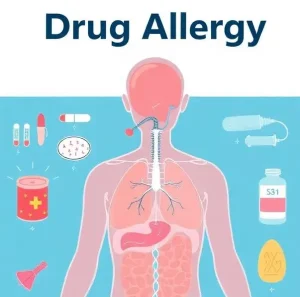Overview
Diagnosis
An accurate diagnosis is essential in identifying a true drug allergy. Research shows that drug allergies are often overdiagnosed, with many people reporting allergies that have never been confirmed. This can lead to the use of alternative treatments that may be less effective or more expensive.
A healthcare professional begins by reviewing your medical history, performing a physical exam, and asking detailed questions about your symptoms. Information about when the symptoms started, the timing of medicine intake, and whether symptoms improved or worsened helps guide the diagnosis process.
In some cases, your healthcare professional may order additional tests or refer you to an allergist, a specialist trained to diagnose allergies.
Skin test
During a skin test, the allergist or nurse introduces a small amount of the suspected medicine into the skin using a tiny needle, injection, or patch. A positive test result typically causes a red, itchy, raised bump on the skin.
-
A positive result suggests that you may have a drug allergy.
-
A negative result can be less definitive. For some medicines, it may rule out an allergy, while for others, it may not completely eliminate the possibility.
Blood tests
Blood tests can help rule out other conditions that might cause similar symptoms. Although blood tests exist for detecting allergic reactions to certain medicines, they are not commonly used due to limited research on their accuracy. They may be recommended when there is concern about a serious reaction from a skin test.
Results of diagnostic work-up
After reviewing your symptoms and test outcomes, a healthcare professional will reach one of the following conclusions:
-
You have a drug allergy
-
You do not have a drug allergy
-
You may have a drug allergy, but the certainty varies
These findings help guide future treatment decisions and medication choices.
Treatment
Treatment for a drug allergy involves two main approaches:
-
Managing current allergy symptoms
-
Allowing safe use of a medicine if it is medically necessary despite an allergy
Treating current symptoms
Treatment may include:
-
Stopping the medicine: Discontinuing the suspected drug is the first and most important step. In many cases, symptoms resolve once the medicine is stopped.
-
Antihistamines: These medications, such as diphenhydramine (Benadryl), help block the immune chemicals responsible for allergic reactions.
-
Corticosteroids: Oral or injectable corticosteroids may be prescribed for moderate to severe reactions.
-
Treatment of anaphylaxis: Severe allergic reactions require immediate treatment with an epinephrine injection and hospital care to support breathing and blood pressure.
Taking allergy-causing medicines
If a medicine that causes an allergic reaction is essential, healthcare professionals may use specific strategies under close supervision. These approaches are not used if a medicine has caused life-threatening reactions in the past.
Graded challenge
A graded challenge is used when a drug allergy is uncertain and the healthcare professional believes the allergy is unlikely. The patient receives gradually increasing doses of the medicine, usually in two to five steps, until the full therapeutic dose is reached. If no reaction occurs, the medicine may be considered safe to use.
Drug desensitization
When a medicine is necessary despite a known allergy, drug desensitization may be an option. This process involves administering very small doses of the medicine and slowly increasing them every 15 to 30 minutes over several hours or days. If the desired dose is reached without a reaction, the medicine can typically be continued safely under supervision.
Advertisement

